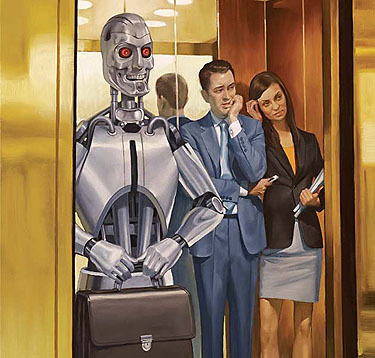Many mainstream macroeconomists hold on to the hope that they will not be doomed forever to always ‘fight the last war,’ but instead, building on timeless microfoundational rules — Lucas ‘deep parameters’ — they will be able to predict upcoming problems before they happen. Adding some new little twist to the DSGE model will make all the difference … What these economists ‘forget,’ however, is that to produce these n:th variations of the basic DSGE model, they still have to make ridiculously simplifying assumptions to make the models ‘work’. This is nothing but the age-old machine dream of neoclassical economics — an epistemologically founded cyborg dream that disregards the fundamental ontological fact that economies and societies are open — not closed — systems. The empirical and theoretical evidence is clear. Predictions and forecasts are inherently difficult to make in a socio-economic domain where genuine uncertainty and unknown unknowns often rule the roost. The real processes that underly the time series that economists use to make their predictions and forecasts do not confirm with the assumptions made in the applied statistical and econometric models. Much less is a fortiori predictable than standardly — and uncritically — assumed.
Topics:
Lars Pålsson Syll considers the following as important: Economics
This could be interesting, too:
Lars Pålsson Syll writes Schuldenbremse bye bye
Lars Pålsson Syll writes What’s wrong with economics — a primer
Lars Pålsson Syll writes Krigskeynesianismens återkomst
Lars Pålsson Syll writes Finding Eigenvalues and Eigenvectors (student stuff)
 Many mainstream macroeconomists hold on to the hope that they will not be doomed forever to always ‘fight the last war,’ but instead, building on timeless microfoundational rules — Lucas ‘deep parameters’ — they will be able to predict upcoming problems before they happen. Adding some new little twist to the DSGE model will make all the difference …
Many mainstream macroeconomists hold on to the hope that they will not be doomed forever to always ‘fight the last war,’ but instead, building on timeless microfoundational rules — Lucas ‘deep parameters’ — they will be able to predict upcoming problems before they happen. Adding some new little twist to the DSGE model will make all the difference …
What these economists ‘forget,’ however, is that to produce these n:th variations of the basic DSGE model, they still have to make ridiculously simplifying assumptions to make the models ‘work’.
This is nothing but the age-old machine dream of neoclassical economics — an epistemologically founded cyborg dream that disregards the fundamental ontological fact that economies and societies are open — not closed — systems.
The empirical and theoretical evidence is clear. Predictions and forecasts are inherently difficult to make in a socio-economic domain where genuine uncertainty and unknown unknowns often rule the roost. The real processes that underly the time series that economists use to make their predictions and forecasts do not confirm with the assumptions made in the applied statistical and econometric models. Much less is a fortiori predictable than standardly — and uncritically — assumed. The forecasting models fail to a large extent because the kind of uncertainty that faces humans and societies actually makes the models strictly seen inapplicable. The future is inherently unknowable — and using statistics, econometrics, decision theory or game theory, does not in the least overcome this ontological fact. The economic future is not something that we normally can predict in advance. Better then to accept that as a rule “we simply do not know.”
In an interesting discussion on the hopelessness of accurately modeling what will happen in the real world, Nobel laureate Kenneth Arrow – in Eminent Economists: Their Life Philosophies (CUP 1992) – pretty well sums up what the forecasting business is all about:
It is my view that most individuals underestimate the uncertainty of the world. This is almost as true of economists and other specialists as it is of the lay public. To me our knowledge of the way things work, in society or in nature, comes trailing clouds of vagueness … Experience during World War II as a weather forecaster added the news that the natural world as also unpredictable.
An incident illustrates both uncertainty and the unwillingness to entertain it. Some of my colleagues had the responsi-bility of preparing long-range weather forecasts, i.e., for the following month. The statisticians among us subjected these forecasts to verification and found they differed in no way from chance. The forecasters themselves were convinced and requested that the forecasts be discontinued. The reply read approximately like this: ‘The Commanding General is well aware that the forecasts are no good. However, he needs them for planning purposes.’
